Bruins’ Kelly Finds His Spot : Volleyball: After redshirt season, he rises to become one of UCLA’s top players.
When most people see UCLA’s 6-foot-10 Tim Kelly they think: Basketball player.
When opposing volleyball players face him across the net they think: Nightmare.
Kelly, who can reach above an eight-foot-high volleyball net and swat the ball with his feet on the floor, was fourth in the nation in hitting with a .450 average and tied for fourth in blocking with an average of 1.9 a game near the end of last week.
A redshirt freshman from Santa Barbara, Kelly has been a ray of hope for Coach Al Scates’ Bruins, who have struggled this year largely because of injuries to key players. “I’ve never had a year like this . . . with so many players injured,” Scates said.
All-American senior Mike Whitcomb, a quick hitter or middle blocker like Kelly, came down with mononucleosis and has played in only 10 of 16 matches and only about half of the games in those matches. The 6-9 Whitcomb “is just now regaining his strength and quickness,” Scates said.
Freshman quick hitter Chris Pliha, who was being considered as a replacement for Whitcomb, hasn’t played at all this season because of a shoulder injury and had surgery last week.
Rich Bland, a sophomore technique man (the player opposite the setter), who averaged 1.36 blocks a game in the four matches in which he competed, has an inflamed disc in his back and hasn’t played since early in the season.
Sophomore technique man Dan Landry has a shoulder that pops out of the socket now and then, sometimes during matches, but he is averaging a team-high 4.83 kills a game.
Scates said that because of the injuries he has been tempted to use four redshirts who have seen no action this season. But he has refrained from doing so, and Kelly and his teammates may yet lead a UCLA resurgence.
The Bruins, ranked sixth nationally, are only 9-7 overall, but they lead the DeGroot Division of the Western Intercollegiate Volleyball Division at 8-4.
And Scates, whose teams have won 13 NCAA championships, is becoming more confident about UCLA as the regular season nears its end. He said he thinks the Bruins can win their remaining four WIVA matches and give top-ranked USC, the Wilson Division leader, a challenge in the WIVA tournament, a prelude to the NCAA championships.
One reason for Scates’ confidence is Kelly, who said he might have continued playing basketball if he hadn’t met Fred Sturm, a former UCLA volleyball player and now coach of the U.S. national team. He said that Sturm, then head coach at Stanford, was the first coach to try and recruit him for volleyball when he was a senior at Dos Pueblos High in Santa Barbara.
Kelly said that several NCAA Division II colleges and UC Santa Barbara were interested in him as a basketball player but that he decided on volleyball because he had tired of basketball, which he had been playing since he was in the first grade.
He began playing volleyball in junior high school, he said, and he thought it would be “fun to be in there and help (volleyball) grow.” he said that he was also persuaded to concentrate on volleyball because of the possibilities of one day having a professional career on the beach tournament circuit and also in European indoor leagues.
He said he chose UCLA and Scates over Stanford and Sturm because he “got to stay in Southern California, and I love the beach and the sand. And (Scates and UCLA) may not win (a national championship) one year but will come back and win one the next year.”
Kelly didn’t enjoy sitting on the sidelines as a redshirt in his first year at UCLA but thought it was probably best for him because he wouldn’t have played much last year behind Whitcomb and Trevor Schirman, another All-American, who completed his eligibility last year.
“It was really hard to practice all day and not play,” he said. “But I became a much better blocker, quicker and (learned to) play better defense than in high school.
“(The layoff) helped me get stronger and to understand the system, the way Al runs things. You feel at ease coming on the court and understand what’s expected of you a lot more.”
Kelly has done a lot more this year than Scates had expected. “He’s making a fine contribution,” Scates said of Kelly. “He can block balls while still standing flat-footed. He can contain an opponent’s middle attack and still get outside and jump (against) an outside hitter. A shorter player will have to jump (in the middle) and then can’t get outside.
“He has got a chance to go to the national team and to make six figures (as a professional) in Europe. He has got to learn a little bit more about blocking, and he’ll do that in a couple of years. He has to get a tougher serve, but that seems to be coming along too. For a freshman, he’s been amazing and has really done a good job.”
Scates is not the only coach who thinks well of Kelly. Pepperdine Coach Marv Dunphy, who guided the U.S. team to a gold medal in the 1988 Olympics, said that Kelly has attributes that one might not expect in a player so tall.
“For someone who is 6-10, you say that he must be a great hitter and blocker, but you take that for granted,” Dunphy said. “But it (also) seemed like he has pretty good court presence for a guy his size and age; that’s what caught my eye.”
Kelly may be a standout because of his height, but he may wind up being above a crowd of outstanding volleyball players. If that happens, it will come not only because of his ability but also because of his capacity to work hard to make himself a better player.
He said that he realized that sitting out his first year was the best thing he could do because he wouldn’t have played much, nor particularly well, behind Whitcomb and Schirman.
“I didn’t want to waste a year on the bench, and there were things I had to work on, like my approach to the net. And my footwork was a little slow.”
He also worked on his body, lifting weights in a strenuous program that raised his weight from a scrawny 190 pounds to a sinewy 220.
He said that the Bruins, despite their many injuries, have managed to improve as a team. He said that Landry hasn’t seemed to be bothered lately by his shoulder problem and that freshman swing hitter David Swatik, a graduate of Mira Costa High in Manhattan Beach, “has been blocking a ton of balls in practice and has been hitting really hard.”
He said he thinks he is adjusting well to the college game, which is so different from high school volleyball. “In high school, you have one or two good players and you set them every ball because they pretty much run your team. In college, you have a much more specialized role, which for me is blocking.
“Al (Scates) was a good blocker (when he played), and our team is based on the block. One problem we’ve had is digging behind the block. That’s been a little weak, but I think it’s turning around for us.”
He said UCLA’s season may be doing the same thing.
More to Read
Go beyond the scoreboard
Get the latest on L.A.'s teams in the daily Sports Report newsletter.
You may occasionally receive promotional content from the Los Angeles Times.






